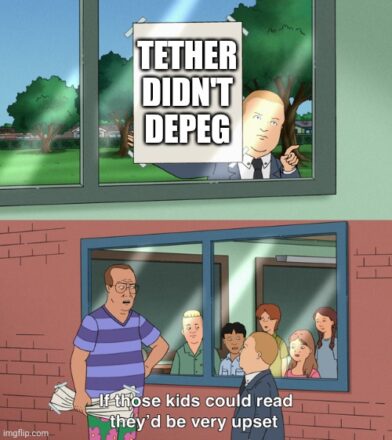
No, USDT Didn’t Actually Lose Its Peg: Tether CTO
Unusual price discrepancies on Binance.US has seen cryptocurrencies, including Tether, trading at a discount, but Tether CTO explains away the FUD.
Binance.US, the American branch of the world’s largest crypto exchange, is experiencing an unusual price differentiation that has seen cryptocurrencies trading at discounts of around $3,000. The difference is noticeable across several cryptocurrencies such as Bitcoin and Ether, as well as stablecoins such as Tether.
The price of Bitcoin on Binance.US is around $27,536, roughly 8.5% lower than its global spot price of $30,106, as of July 9. Ether is also trading at a discount, approximately $200 cheaper than its global price. Even Tether, typically pegged 1:1 with the USD, is transacting at around $0.915 on the platform.
WOAH. Bitcoin is trading at $26,970 on binance US vs it’s $30,300 (real price)
Ethereum is $200 lower than normal
USDT is at 0.889 cents 🤯 pic.twitter.com/LgKeMEDZQv
— borovik (@3orovik) July 9, 2023
Operational constraints seem to be at the core of this issue. Binance.US ceased accepting new USD deposits on June 9, leaving users only able to purchase crypto with pre-existing funds in their accounts. This, along with withdrawal restrictions, has led to some users liquidating their assets below market value.
However, the discounted trading of Tether on Binance.US doesn’t necessarily denote a depegging issue with the stablecoin itself. Amid the ongoing legal uncertainty surrounding Binance.US, market makers could be avoiding arbitrage opportunities, yet this hasn’t affected Tether’s near-par value on Binance.com and other exchanges.
Arbitrage is an investment strategy that capitalizes on minute price discrepancies in two or more markets for identical or nearly identical assets. The arbitrageur executes simultaneous buy and sell transactions across these markets, leveraging the price differential to secure a profit.
Tether chief technology officer Paolo Ardoino explained on Twitter why Tether was sold for less on Binance.US, and why that doesn’t mean USDT has been depegged:

Tether’s management oversees its primary market, while the secondary markets, such as crypto exchanges, are the domain of arbitrageurs and market professionals. The discounted pricing observed for other cryptocurrencies like BTC on Binance.US does not suggest a global devaluation for these assets. The same line of reasoning applies to USDT as well.
Finally, both BTC/USD and USDT/USD pairs on Binance.US show comparable spreads, indicating the issue is likely systemic to the exchange rather than a specific cryptocurrency issue.
